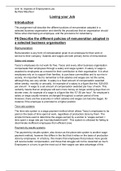Unit 14: Aspects of Employment Law
By Rais Mauthoor
Losing your Job
Introduction
This assignment will describe the different policies of remuneration adopted in a
selected business organisation and identify the procedures that an organisation should
follow when dismissing an employee, and the provisions for redundancy.
P6 Describe the different policies of remuneration adopted in
a selected business organisation
Remuneration
Remuneration is any form of compensation given to an employee for their work or
service to their company. Salaries and wages are both primary forms of remuneration.
Salary and wages
Tesco’s employees do not work for free. Tesco and every other business organisation
compensate their employees through a salary and wage system. A salary or wage is
awarded to employees as a reward for their contribution to their organisation. It is what
employees rely on to support their families, to purchase commodities and to survive in
society. An important fact to remember is that salaries and wages are not the same,
although they are very similar. A salary is a fixed amount of compensation awarded
either weekly, monthly or annually. An example of a salary is a figure like this “£25,000
per annum”. A wage is a set amount of compensation awarded per hour of work. This
certainly means that an employee will earn more money on longer working days than on
shorter ones. An example of a wage is a figure like this “£7.50 per hour”. An employee’s
salary or wage usually remains unchanged throughout a certain period of time.
However, there are few scenarios in which salaries and wages can become bigger, for
instance if the employee is promoted to a higher position.
Time rate systems
The time rate system is a wage payment method which allows Tesco’s employees to be
paid on the basis of time spent at work, regardless of production done by them. The
simple formula used to determine the wages earned by a worker is “wages earned =
time spent x wage rate per hour/day/week/month”. This system is criticised for failing to
discriminate inefficient employees from efficient ones.
Payment-by-results systems
The payment-by-results system, also known as the piece-rate system is another wage
payment method, however this differs in the fact that it relies on the basis of production
done by employees. In a factory, this means that employees that produce more goods
will receive better compensation, and those that struggle will not be rewarded as much.
Employees in a hurry to get the most out of their wages can take advantage of this






